|
|
|
Sort Order |
|
|
|
Items / Page
|
|
|
|
|
|
|
| Srl | Item |
| 1 |
ID:
138093
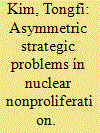

|
|
|
|
|
| Summary/Abstract |
This article explains cooperation problems between powerful democratic states and weak non-democratic states in the context of nuclear nonproliferation. Focusing on the interactions of the United States with North Korea, Iran, and Libya, it suggests that power asymmetry and information asymmetry foster mutual distrust by exacerbating two main strategic obstacles to cooperation: the time inconsistency of the stronger state’s policy and the incomplete information regarding the nondemocratic states. The nature of negotiations over nuclear weapons programs further exacerbates these problems. The overall implications of this article leave us pessimistic about the possibility of negotiated nuclear disarmament, but the theoretical analysis may help the negotiation strategy of the United States.
|
|
|
|
|
|
|
|
|
|
|
|
|
|
|
|
| 2 |
ID:
095637
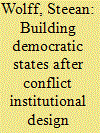

|
|
|
| 3 |
ID:
132526
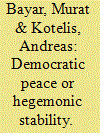

|
|
|
|
|
| Publication |
2014.
|
| Summary/Abstract |
Democratic peace theory (DPT) and hegemonic stability theory provide different explanations for cooperation among (democratic) states. The Imia/Kardak crisis took place between Greece and Turkey, two democratic, nonnuclear, and interdependent states in the post-Cold War era, thus, offers rare insights into these theorized processes. During this crisis, democratic actors and issues contributed to escalation, whereas war was prevented in the last minute by the coercive diplomacy of the USA. Based on our archival research in Greece and Turkey, our findings pose a challenge to the validity of the DPT for democratic dyads with territorial conflicts.
|
|
|
|
|
|
|
|
|
|
|
|
|
|
|
|
| 4 |
ID:
093089
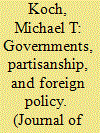

|
|
|
|
|
| Publication |
2009.
|
| Summary/Abstract |
Do variations in partisanship and political outcomes among democratic states affect the duration of militarized interstate disputes? To answer this question, the author develops a model of partisan competition derived from the government failure literature. The author argues factors associated with government failure determine the ability of governments to contend with the domestic political costs of militarized disputes, specifically the duration of those disputes. The author tests his expectations using hazard analysis on a dataset of 20 democratic governments and militarized disputes between 1945 and 1992. The results suggest the outcome of party competition in the form of a government's sensitivity to the potential political costs of conflict is an important part of the conflict process. The author concludes that differences in domestic political outcomes influence the duration of militarized interstate disputes. Governments that are politically more secure in their tenure engage in longer disputes. Alternatively, governments that are more vulnerable have significantly shorter disputes. In addition, because government partisanship contributes to vulnerability, it also affects dispute duration, with governments of the left engaging in shorter disputes, while governments of the right fight longer disputes.
|
|
|
|
|
|
|
|
|
|
|
|
|
|
|
|
| 5 |
ID:
100272


|
|
|
|
|
| Publication |
2010.
|
| Summary/Abstract |
Some studies find that democratic states are more amenable to third party forms of conflict management, while other studies indicate that democracies are able to resolve contentious issues on their own through bilateral negotiations. Using data from the Issue Correlates of War (ICOW) Project, the authors investigate peaceful and militarized conflict management strategies that democratic states employ to resolve contentious issues. Theoretically, the authors focus on how militarized conflict history, relative capabilities, and issue salience influence the tools of conflict management employed by democratic states. Empirical analyses suggest that democratic dyads employ bilateral negotiations more often to resolve contentious issues when the issue has not been militarized previously, when the issue is more salient, and when democratic states face equal adversaries. Democratic dyads seek out nonbinding third party settlement more frequently in situations of power preponderance than nondemocratic dyads, although binding forms of third party settlement occur most often in relatively equal democratic dyads. When it comes to the use of force, democratic states are much less likely than their authoritarian counterparts to militarize an issue claim when little or no armed conflict characterizes the relationship. However, democratic leaders show a willingness to confront force with force. After one militarized dispute, democratic states are no different in their conflict propensity than autocratic states.
|
|
|
|
|
|
|
|
|
|
|
|
|
|
|
|
| 6 |
ID:
146162


|
|
|
|
|
| Summary/Abstract |
Democratic states sometimes engage in covert interventions—sometimes involving forcible regime change—against other democracies. Critics charge that these interventions raise doubts about the robustness of the “democratic peace.” I argue that they require analysts to rethink some aspects of democratic-peace theory. Democratic states base their behavior toward other democracies on expectations about the future trajectory of their regimes: whether, and to what extent, those states will likely remain democratic in the future. When they expect democracy to persist, the constraints of the democratic peace operate. But when democracies expect another state's democratic character to break down, or decay, they prove more willing to engage in covert forcible regime change. I test my dynamic version of democratic-peace theory by examining US efforts to forcibly depose Iran's Mohammed Mossadegh (1953) and Chile's Salvador Allende (1970–1973). The framework developed here helps to resolve a longstanding anomaly for the democratic peace—secret interventions between democracies—while also providing policymakers with a clearer sense of the stakes associated with covert democracy promotion and subversion.
|
|
|
|
|
|
|
|
|
|
|
|
|
|
|
|
| 7 |
ID:
116225
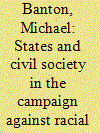

|
|
|
|
|
| Publication |
2012.
|
| Summary/Abstract |
Since 1970, states that are parties to the International Convention on the Elimination of Racial Discrimination have been reporting on the implementation of their treaty obligations. In the first two decades, states assumed the right to define the issues. Because of changes in the practice of the treaty-monitoring body, nongovernmental organizations in the more democratic states have been increasingly able to contribute alternative perspectives. This has been a significant step in the development of global civil society.
|
|
|
|
|
|
|
|
|
|
|
|
|
|
|
|
| 8 |
ID:
133650
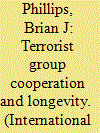

|
|
|
|
|
| Publication |
2014.
|
| Summary/Abstract |
Why do some terrorist groups survive considerably longer than others? The literature is just beginning to address this important question in a systematic manner. Additionally, and as with most studies of terrorism, longevity studies have ignored the possibility of interactions between terrorist groups. This article attempts to address these two gaps in the literature: the incomplete understanding of terrorist group survival and the tendency to assume that terrorist groups act independently. In spite of risks associated with cooperation, I argue that it should help involved terrorist groups mitigate mobilization concerns. More importantly, the impact of cooperation is conditioned by attributes of the country in which a terrorist group operates. Using new global data on terrorist groups between 1987 and 2005, I show that cooperation has the strongest effect on longevity in states where groups should have a harder time operating-more capable states and less democratic states. Interestingly, a group's number of relationships is more important than to whom the group is connected.
|
|
|
|
|
|
|
|
|
|
|
|
|
|
|
|
| 9 |
ID:
125073
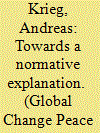

|
|
|
|
|
| Publication |
2013.
|
| Summary/Abstract |
The heavy direct or indirect reliance of liberal states on the military and security services of the private contractor in contemporary warfare is an undeniable reality. While the literature presents a wide array of different empirical explanations of why liberal states have come to increasingly rely on contractor support, this paper attempts to give a normative explanation to this development. This paper does not aim to refute the existing explanations but merely complement the most commonly stated reasons for outsourcing. It argues that the liberal state's hiring of private contractors can be understood against the backdrop of a wider trend whereby liberal states, increasingly operating in non-trinitarian operations, attempt to replace the soldier as a trinitarian servant with non-trinitarian means of warfare. This correlation between liberal state commitments in non-trinitarian warfare and a growing employment of non-trinitarian means of warfare can be explained by Social Contract theory and lays the foundation for a normative understanding of why liberal states resort to non-trinitarian contractor support amid non-trinitarian crises.
|
|
|
|
|
|
|
|
|
|
|
|
|
|
|
|
| 10 |
ID:
086150
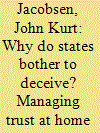

|
|
|
|
|
| Publication |
2008.
|
| Summary/Abstract |
Why do democratic states try to deceive their own citizens as to the foreign policies they practice, their motives, and their consequences? This question presupposes not only that states craft 'stories' to disguise activities abroad, but that they do so because they are constrained by an audience of non-elite actors. Theories derived from realpolitik, at best, make little allowance for such domestic 'interference'. Yet there is evidence that in democracies the role of mass publics in driving, curbing, or modifying the conduct of foreign policy is a force, and explanatory factor, to reckon with.
|
|
|
|
|
|
|
|
|
|
|
|
|
|
|
|
|
|
|
|
|